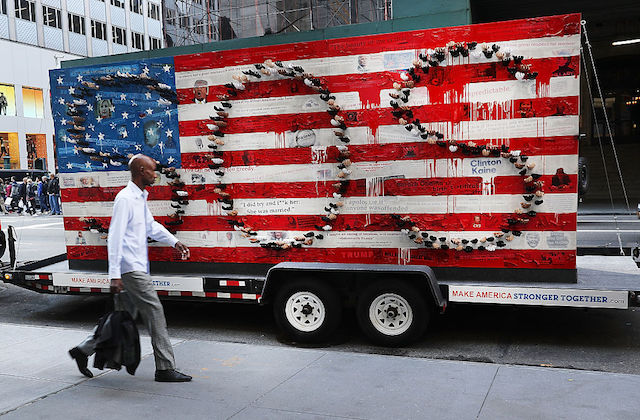When now-President Donald Trump won the general election without securing the popular vote, he tweeted—and constantly repeated—an accusation that has been thoroughly debunked: that he didn’t have the most votes because 3 to 5 million people, specifically undocumented immigrants, voted illegally.
Rather than back away from the untrue claim, he used his position as the leader of the nation to create the Presidential Advisory Commission on Electoral Integrity, which is scheduled to hold its first public meeting today (July 19). Commission Vice Chair Kris Kobach’s request for states to turn over voter data was rejected by most states, but as Vanita Gupta writes today in an op-ep for The New York Times, the fight is not over.
In “The Voter Purges Are Coming,” Gupta—who formerly served as the head of the Department of Justice’s (DOJ) Civil Rights Division and is now the president and CEO of The Leadership Conference on Civil and Human Rights—writes that the DOJ will be a powerful ally for the GOP-led commission.
Lost amid the uproar over the commission’s request was a letter sent at the same time by the Justice Department’s Civil Rights Division. It forced 44 states to provide extensive information on how they keep their voter rolls up-to-date. It cited the 1993 National Voter Registration Act, known as the Motor-Voter law, which mandates that states help voters register through motor vehicle departments.
The letter doesn’t ask whether states are complying with the parts of the law that expand opportunities to register. Instead it focuses on the sections related to maintaining the lists. That’s a prelude to voter purging.
Usually the Justice Department would ask only a single state for data if it had evidence the state wasn’t complying with Motor-Voter. But a blanket request to every state covered under that law is virtually unprecedented. And unlike the commission, the Justice Department has federal statutory authority to investigate whether states are complying with the law.
Gupta goes on to explain how the Trump Administration can use this data to suppress the votes of people of color:
Here’s how the government will use voters’ data. It will create a national database to try to find things like double-voters. But the commission won’t be able to tell two people with the same name and birthday apart. Such errors will hit communities of color the hardest. Census data shows that minorities are overrepresented in 85 of the 100 most common last names.
Purging voters is part of a larger malicious pattern that states have employed across the country. Georgia and Ohio are being sued for carrying out early versions of what we can expect from the Trump Administration.
NPR reports that there are at least seven lawsuits already pending against the commission—including one filed by the NAACP Legal Defense and Educational Fund yesterday (July 18) that alleges that it “was formed with the intent to discriminate against voters of color”—but Gupta doesn’t think that legal challenges will stop the group from gaining traction.
But my biggest fear is that the government will issue a report with “findings” of unsupported claims of illegal voting, focused on communities of color.
These wild claims won’t be just hot air. Members of Congress will seize on them to turn back protections in federal law. States will enact new barriers to the ballot box. Courts will point to the commission’s work to justify their decisions.
The irony is that there are serious threats to our voting systems, from cyberattacks to aging machines to Russian interference to discriminatory voter ID laws at the state level. Those are the real problems, but that’s not what the commission was created to address.
Read the full essay here.
